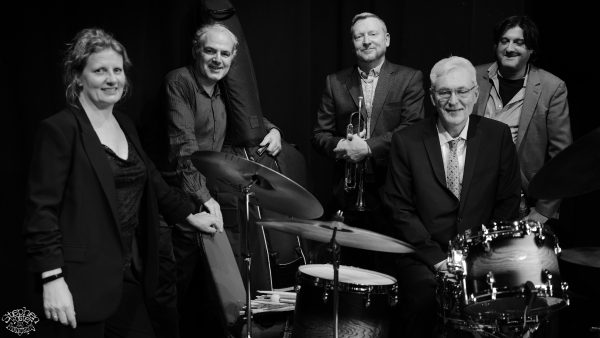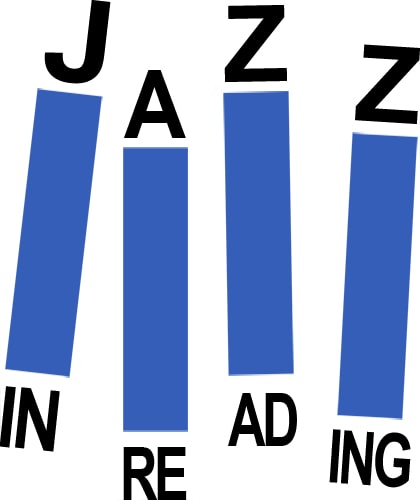Partners in Time – Historic Sax/Trumpet Partnerships – October 2023

Progress Theatre, Reading Friday 6 October 2023
Stuart Henderson trumpet & flugelhorn, Karen Sharp tenor & baritone saxophones, Leon Greening piano, Raph Mizraki bass, Simon Price drums
Any band bearing the hallmark of Stuart Henderson guarantees certain qualities of performance: exciting and neatly arranged jazz at its most swinging; a well-researched and perfectly balanced programme accompanied by Henderson’s informative and good-humoured introductions; brilliant musicians at the top of their game who love the music and relish striking sparks off each other without over-staying their welcome in the solo spotlight, not to mention a built in ‘WOW’ factor that on this occasion threatened to lift the roof of the tiny Progress Theatre. It goes without saying that the sell-out audience responded with rapturous applause as they thrilled to the music.
Henderson also has the gift for working his programmes around an original theme; in this case, ‘Partners In Time’, the classic front-line trumpet/saxophone partnerships that define so much great jazz across a spectrum of eight decades spanning the bebop innovations of Dizzy Gillespie and Charlie Parker in the 1940s to the present day.
Henderson picked out a dozen gems from this rich vein opening with a languid interpretation of ‘Pennies From Heaven’ inspired by the majestic pairing of fellow Basie-ites Harry Edison and Lester Young on the 1956 album ‘Pres and Sweets’. An object lesson in economy and relaxed swing, Karen Sharp’s slightly laid-back tenor provided the perfect foil to Henderson’s’ tightly muted trumpet.
Leon Greening’s stunning introduction moved up the throttle by several notches as he led the way into a hard-edged delivery of ‘Out of the Night (Came You)’, a Horace Silver number from his post-Blue Note album ‘Silver ‘N Voices’, giving full rein to Henderson’s burnished trumpet and Karen Sharp’s expressive tenor.
Dizzy Gillespie’s calypso ‘And Then She Stopped’ brought back memories of seeing the quintet which recorded this track in person, with James Moody on tenor and flute, at the New Theatre, Victoria (now the Apollo) when it toured the UK way back in 1965. Ever the clown, Dizzy announced that he would introduce the members of the band. With that, the five guys began to greet each other with smiles, gracious bows and handshakes as if they’d never met before. Dizzy had probably pulled the trick hundreds of times, but it still had the audience falling about with laughter. After the concert, amid a melee at the stage door, a very young Kenny Barron obliged my friend and I with an autograph.
‘And Then She Stopped’ captured all the joyful spirit that I recall from those far off days, as well as providing an outing for Simon Price’s ‘jiggery-pokery’ with mallets on his drums and an amazing duet with Raph Mizraki, who used the body of his bass to conjure incredible percussive effects.
Star soloists Clark Terry and Paul Gonsalves took time out from the Duke Ellington Orchestra in 1957 to record ‘Duke With a Difference’ for the Riverside label. This featured eight Ellington standards including ‘Mood Indigo’. The combination of Henderson’s trumpet – wah-wah mute and open, Karen Sharp’s mournful tenor and Raph Mizraki’s bass evoked the full plaintive beauty of this Ellington classic.
Another Duke, in this case pianist and composer Duke Pearson, contributed ‘Duke’s Mixture’ to the prolific Blue Note partnership of Donald Byrd and baritone saxist Pepper Adams. Taking up the monster instrument Karen Sharp blew a storm over Simon Price’s incisive shuffle-rhythm, to be followed by a positive tsunami of invention from Leon Greening – no wonder they are each regarded as the best musicians on their respective instruments anywhere around. Nor should we forget Stuart Henderson who held the audience spellbound as his trumpet soared to the heavens.
Stevie Wonder’s ‘You Are The Sunshine of My Life’ provided the perfect antidote to the previous heart-stopping excitement. It calmed the pathway to the interval with a gorgeous Latin arrangement drawn from Jim Rotundi and Eric Alexander’s 1997 collaboration ‘Jim’s Blues’.
The second set opened with a glorious cacophony of traffic noises – screeching brakes, honks and hoots, interspersed with snatches of the ‘Can-Can’, ‘Marseillaise’ and Gershwin’s ‘American in Paris’ – the colourful introduction to Bud Powell’s depiction of a ‘Parisian Thoroughfare’. Made famous by trumpeter Clifford Brown and his tenor partner Harold Land in 1954, our own Partners in Time kept up the dizzying pace as they raced through the streets of Paris.
‘The Killers of West 1’ brought us closer to home with a scaled down version of Tubby Hayes’ 1964 arrangement for his big band. With its feel for the hip, vibrant scene of ‘Swinging London’ and kicked along by Simon Price’s crisp drumming, this served as a fine tribute to Tubby, arguably the greatest jazz musician Britain has ever produced, and his long-term sparring partner, Scots trumpeter Jimmy Deuchar.
The inclusion of ‘Line for Lyons’, a classic recording by Gerry Mulligan’s piano-less quartet of 1952, gave Leon Greening the chance of a short rest. It was well-earned. ‘I had not heard him before,’ confessed one member of the audience. ‘He is simply amazing!”
Leon clearly took delight in the delicate interplay between Henderson’s trumpet and the sonorous tones of Karen Sharp’s baritone sax, adding his applause to those of the audience at the end of the number.
It’s a measure of the band’s skill and versatility that they could move with seemingly effortless ease from the homely comfort of the Mulligan Quartet to the spacious, other-worldly territory of Wayne Shorter’s ‘Witch Hunt’. Taken from Shorter’s 1964 Blue Note album ‘Speak No Evil’ when Freddie Hubbard partnered Wayne in the front-line, it featured a beautiful bass solo by Raph Mizraki amongst its many highlights.
Given its place in the pantheon of jazz recordings, tunes from ‘Kind of Blue’ are rarely, if ever, played live. Could it be a case of ‘How do you match perfection?’ Leon Greening, with the sensitive support of the rhythm section, set the scene for a sublime and utterly compelling performance of ‘Blue in Green’. Once again, though in a very different context to ‘Pennies from Heaven’, Karen Sharp’s full-toned tenor played the perfect foil to the heart-wrenching muted trumpet of Stuart Henderson – a la Miles Davis and John Coltrane.
Sadly, the ten o’clock deadline drew near, beckoning the return of the hired piano to its home in Hickie’s Devon storeroom. What a pleasure it had been to listen to Leon Greening at his inventive best on such a magnificent instrument. Thank you Hickies!
There was time for one more number; a finale and encore rolled into one. And what better choice than Lee Morgan’s ‘The Rumproller’. Everyone pulled out the stops for a truly spectacular close to a superb evening of jazz – rasping trumpet, wailing sax, two-fisted piano, grooving bass and explosive drums. WOW!
Needless to say, everyone had a great evening and left with a smile on their face.
Our thanks to the members of the band and the Progress team who look after everyone’s comfort and wellbeing with such warm hospitality.
Review posted here by kind permission of Trevor Bannister
Photo by Steve Foster @jazzshots (Instagram & FB)
